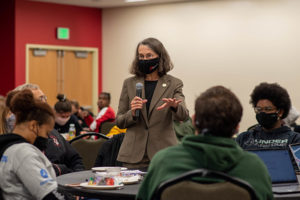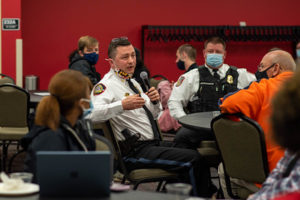FSU Town Hall Meeting Briefing – 11/02/21

On November 2, 2021, a Town Hall meeting was held, beginning at 6:00pm. The meeting began with a brief introduction of a few notable local officials, such as Commissioner of Water, Parks & Recreation- Nina Forsythe, Commissioner of Public Safety- Kevin Grove, Police Chief- Nick Costello, FSU Police Lieutenant- Jason McCumber, Frostburg Mayor- Robert Flanigan, Vice President for Regional Development and Engagement- Al Delia, Vice President of Administration & Finance- Troy Donoway, Dean of the CLAS- Dr. Kim Hixson, Interim Provost- Dr. Mike Mathias, FSU President- Dr. Ronald Nowaczyk, Bill Mandicott, and various FSU SGA members.
The Town Hall was centered around campus and local issues.
The first topic discussed in the Town Hall was deforestation and general sustainability in the local community. The initial concern cited a New York Times article discussing the Biden Administration join other states’ efforts to help fight the impact of deforestation by 2030; the student followed by questioning if there was a community at Frostburg that helped towards this effort. The response was a resounding “yes”, as students spoke of Arbor Day events, using less paper now that classes are back in person, protecting the Arboretum on FSU’s campus, maintaining the local watershed, and redesigning the drainage system across campus. Commissioner of Water, Parks and Recreation, Nina Forsythe, chimed in to point out the various efforts that the local community has enacted, such as a recent act of planting around 65 trees in the watershed area which filters groundwater, and that the best thing our local community can do to is remain vigilant, ensure these areas aren’t privatized, and continue to sustainably manage these areas.
A clarifying statement was made in relation to this concern. VP for Regional Development, Al Delia, addressed a concern that the Task Force on the Economic Future of Western Maryland, of which he is a member, had a plan to privatize Rocky Gap; however, he stated that this was a misconception and that “what we [the Task Force] did was make a recommendation for the existing agencies in the state of Maryland to explore the possibility of creating public private partnerships to enhance the public’s use of the land. For example, food concession stands could be placed there, cabins for overnight stays can be placed at the park, and the investments to make those things happen would be by the private sector, but it would still be for public use.”
Another sustainability concern that was brought up regarded the sustainability fee that FSU students pay. This student that brought up this fact mentioned that they had spoken to multiple professors that run sustainability programs and reported that many of them did not have access to these funds. In response, it was assured that these programs that need funding assistance were being “tracked down” and that there is a committee that determines how that money is spent. For instance, it was recently used to replace light bulbs on campus with LED lights.
Another topic discussed a New York Times article that surrounded the October proposal to make Washington, Allegany, and Garrett counties part of West Virginia. This concern was quickly put to rest, as it was assured that this instance was a “political stunt”, and it was not going to happen.
The third main topic discussed was the rates of unvaccinated versus vaccinated residents in the community. The question was how to encourage more residents to get vaccinated. In response, Robert Flanigan, the mayor of Frostburg, mentioned that there was a $500 incentive for the city’s employees to show proof of vaccination; because of this, well over 80% have now been vaccinated. Other ideas included “rebuilding trust in our institutions”, “inform more and show how what we [FSU students/faculty/staff] have done in terms of vaccination has helped”, “breaking out of groups on social media and looking from a different viewpoint”, “providing incentives”, and “looking to vaccinated relatives as an example to follow”.
The final and largest topic discussed was student safety on campus. The initial concern referred to the disappearance and murder of Miya Marcano, a college student at Orlando’s Valencia Campus. The concerned student asked how FSU students were being kept safe on campus. Lieutenant Jason McCumber was the

first to respond, bringing up a few key points along with the combined input from Police Chief Nick Costello. They stated that there are:
-300+ cameras on campus that are regularly monitored
-blue light phones are dispersed across campus for student use. In the case of feeling unsafe or any emergency, students can press the button of the blue light phones, and they will be put in contact with a deputy for help. Just look for the tall booths with the shining blue light!
-police working 24/7, and the amount of officers on patrol increases during the busiest times along with overlapping shifts to ensure quick responses in case of emergencies.
-the station is nearby, so officers can be on-scene within a few minutes at most.
A few students offered their own tips as well, such as carrying pepper spray, walking in groups, and using Saferide (available on Thursdays, Fridays, and Saturdays- but will hopefully expand to be available on more days). For students that are unsatisfied with cautions to “be aware”, a more proactive protection measure was suggested; a local karate dojo, Kick Masters Karate, provides self-defense courses for men and women. To sign up for these classes, specific information on classes can be found at http://www.kickmasterskarate.com/index2.php or calling the dojo at (301) 689- 8874. With COVID restrictions still ongoing, some classes are unfortunately not currently scheduled.
The final topics briefly discussed involved financial aid confusion and the potential for a bus route to Baltimore for students to visit home. There were concerns regarding the confusing back-and-forth to figuring out financial aid issues. This was addressed by assuring there would be improvements with the introduction of a new director of financial aid as well as changes being made to revise the GEP program to enhance financial literacy among FSU students. As for the bus to Baltimore, it was made known that, due to COVID, this route was temporarily discontinued, but efforts are being made by SGA to rearrange this possibility for students to utilize in the future. In the meantime, there are Bayrunner shuttles ( https://bayrunnershuttle.com/locations/frostburg/ )that run to Baltimore as well as an Amtrak ( https://www.amtrak.com/stations/cum ) that connects to the major cities of central Maryland.
The Town Hall Meeting then adjourned by 7:35PM.




